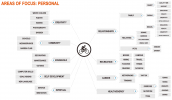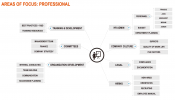So my first question, how much in detail shall I go with areas of focus ?
My second question, how do you use area of focus to connect with projects (1 horizon lower) and with goals (1 horizon higher) ?
I've spent a considerable amount of time thinking about areas of focus and how to account for all the things I'm committed to at the moment and the roles that I play in various organizations and relationships. It's overwhelming, and so much so, that spending a ton of time perfecting the list can potentially distract from the organic maturation of your areas of focus and those higher horizons as you get more experience using the methodology.
Consider the purpose of "Areas of Focus". These are words/short descriptions of the different roles you play in your life, your relationships, and the organizations you belong to. They have two purposes: to trigger possible projects, or next actions as you review the list during your regular (weekly) reviews, and to help you visualize and achieve alignment between next actions and your purpose.
Let's look at the first purpose: trigger possible projects and actions. If you look at your areas of focus: "spirituality", "health", "family"....are those descriptions detailed enough for you to feel satisfied that you've considered your commitments to each and are fulfilling them? If not, feel free to go deeper in any of them. Maybe you split "family" up between "kids", "marriage", and "family" because you want to make sure that you're giving extra consideration every week to your marriage and children. You can do that with any of your areas of focus. Health could be sufficient, but you could instead have "running" or "strength training" or "weight loss" as areas for you to focus in on.
The main idea is to only break them down if to the level where you feel at peace and are satisfied that you're aware of everything you need to be aware of. GTD is so unique in that it is not "one size fits all". One person can cover it all with broad labels for their areas of focus, while the next might need to have more detail because they will miss things if they don't. Balance for each individual is key.
Let's dive into the second purpose, visualize and achieve alignment between your horizons, which also concerns your question about connecting horizons 1-3. For me, areas of focus require a slightly different type of thinking compared to projects and goals, so they may not line up neatly in a mind map or outline. For me, areas of focus are not only a trigger, but also a way to question the things I'm focused on, and to ensure that I continue to focus on things that serve my higher purposes. If I have a goal to live on larger piece of property for my family within 5 years, I should have some areas of focus that serve that goal, or at least do not detract from it. Perhaps "relocating" or "remote work" should be areas of focus for me. Then I might be triggered to establish projects, such as "find five areas we would like to live", or "interview with company xyz for remote position". If I'm busy with areas of focus that don't' further that goal, and I'm already struggling to keep up, then I might need to figure out a way to remove myself from a few commitments so I can further the goal, or question how much that goal actually means to me.
So, to sum this up, our areas of focus should reflect our goals, and our goals should reflect our areas of focus. They should only be detailed to the degree that we need them to be to feel at peace about what we're doing and not doing.


